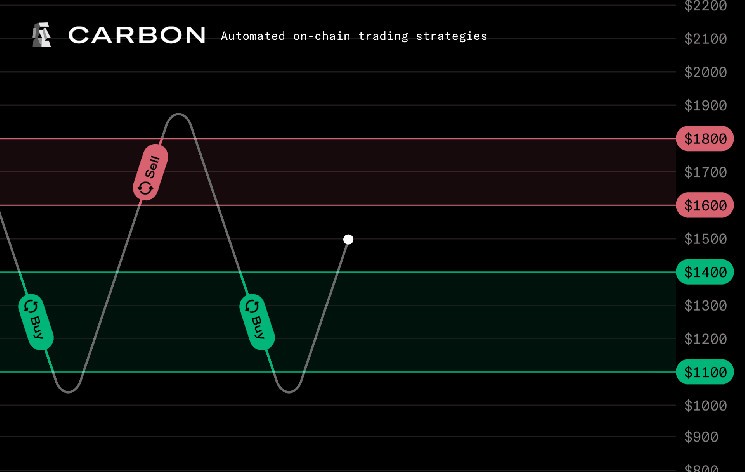Decentralized Exchange Bancor Starts On-Chain Trading Platform Carbon

Bancor, a decentralized exchange (DEX) built on the Ethereum network, has started an on-chain trading platform, Carbon.
The release comes after Bancor’s decentralized autonomous organization (DAO) issued a proposal of the deployment on Ethereum and saw votes 100% skewed in favor of launching. Bancor uses an automated market maker (AMM) smart contract — a mechanism designed to provide liquidity to markets,
Carbon’s aim is to make trading on DEX easier and more advanced through trading functionality of a centralized exchange (CEX) but with the access and transparency of AMMs, according to the press release.
Read more: What Is a DEX? How Decentralized Crypto Exchanges Work
Carbon will create a single concentrated liquidity position that buys and sells only in specific price ranges, according to the press release. “Buy and sell ranges can be placed above and below a set price based on where a user expects a given token will trade, automating the process of swing trading on any ERC-20 token,” the press release said.
Liquidity pools typically require users to provide liquidity in a continuous range of prices, whereas Carbon is offering users the ability to distinguish between buy range and sell range, according to Nate Hindman, Bancor’s head of growth.
Customers will be able to “use a single liquidity position to set a buy range [e.g buy $2,000-$2,100 worth of ETH] and a separate sell range [sell ETH between $2,300-$2,400],” Hindman told CoinDesk.
This will enable users to buy the token low and sell it high, as ETH moves between those ranges. The liquidity automatically rotates between users’ ranges to fill the orders. This is a similar model seen on centralized exchanges, but has lacked on DEXes, said Hindman. “Bringing the trading functionality of CEXs to DEXs is key to driving the next wave of traders on-chain,” he added.
Read more: Decentralized Exchange Bancor Proposes Burning 1M BNT Tokens to Support Prices






 Bitcoin
Bitcoin  Ethereum
Ethereum  Tether
Tether  USDC
USDC  Dogecoin
Dogecoin  TRON
TRON  Cardano
Cardano  Chainlink
Chainlink  Stellar
Stellar  Bitcoin Cash
Bitcoin Cash  Hedera
Hedera  Litecoin
Litecoin  LEO Token
LEO Token  Cronos
Cronos  Monero
Monero  Dai
Dai  OKB
OKB  Ethereum Classic
Ethereum Classic  Algorand
Algorand  VeChain
VeChain  Cosmos Hub
Cosmos Hub  Gate
Gate  KuCoin
KuCoin  Tether Gold
Tether Gold  Stacks
Stacks  Tezos
Tezos  Theta Network
Theta Network  IOTA
IOTA  Zcash
Zcash  NEO
NEO  TrueUSD
TrueUSD  Polygon
Polygon  Qtum
Qtum  Dash
Dash  Decred
Decred  Synthetix Network
Synthetix Network  Basic Attention
Basic Attention  Zilliqa
Zilliqa  0x Protocol
0x Protocol  Ravencoin
Ravencoin  Siacoin
Siacoin  Holo
Holo  DigiByte
DigiByte  Ontology
Ontology  Numeraire
Numeraire  Enjin Coin
Enjin Coin  Nano
Nano  Waves
Waves  Status
Status  Hive
Hive  Huobi
Huobi  Lisk
Lisk  Steem
Steem  Pax Dollar
Pax Dollar  BUSD
BUSD  OMG Network
OMG Network  NEM
NEM  Ren
Ren  Augur
Augur  Bitcoin Gold
Bitcoin Gold